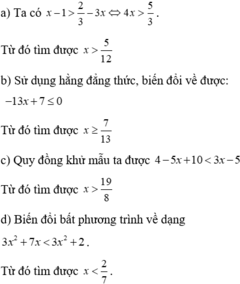(3x - 11)^3 = 2^3 . 490 + 8 . 510

Những câu hỏi liên quan
Tìm x thuộc Z sao cho x^3=3x^2-490
x^3-3x^2+490=0
x^3+7x^2-10x^2-70x+70x+490=0
(x+7)(x^2-10x+70)=0
Suy ra x+7 = 0 hay x^2 - 10x+70 =0
Nhận xét: (x-5)^2+45 lớn hơn 0 vô lý
Suy ra x^2-10x+70 = 0 vô nghiệm
Suy ra x+7=0
Suy ra x= -7
a) 16 - 18/x| = -8 -14|x|
b) 5 x|+7.(2/x|-3) =4.(x-4)+25
e) 15-3|4x +2| = 3 8) 18 -4.(6-2|x|) = - 3.(4|x|+5)+29
8) 27-5/x -10 = 4|x-10| - 18
h) 510 + 3x|-21 = 7- 2|15+3x|
c) 43x +2|-16= 20
d) 8|x - 1|-4 = 12+6|x-1|
giúp em với
Timf `x`:
`(x - 2)/3 = (x + 1)/4`
`(x - 2) . 4 = (x + 1) . 3`
`<=> 4x - 8 = 3x + 3`
`<=> 4x - 3x = 3 + 8`
`<=> (4 - 3)x = 11`
`=> x = 11`
`(x - 2)/3 = (x + 1)/4`
`(x - 2) . 4 = (x + 1) . 3`
`<=> 4x - 8 = 3x + 3`
`<=> 4x - 3x = 3 + 8`
`<=> (4 - 3)x = 11`
`=> x = 11`
`=>` `x = 11`
Đúng 2
Bình luận (0)
Xem thêm câu trả lời
Giải các bất phương trình sau:a)
x
−
1
2
3
−
3
x
;
b)
2
x
−
2
2
−
4
x
2
−
5
x
+
3
≤
0
;
c)
2
5...
Đọc tiếp
Giải các bất phương trình sau:
a) x − 1 > 2 3 − 3 x ; b) 2 x − 2 2 − 4 x 2 − 5 x + 3 ≤ 0 ;
c) 2 5 − x − 2 2 < 3 x − 5 10 ; d) x x + 1 + 2 x x + 3 < 2 + 3 x 2
6. 3 căn 12-4 căn 27+5 căn 487. căn 12+5 căn 3-căn 488. 2 căn 32+4 căn 8-5 căn 189. 3 căn 20-2 căn 45+4 căn 510. 2 căn 24-2 căn 54+3 căn 6-căn 150 11. 2 căn 18-7 căn 2+căn 16212. 3 căn 8-4 căn 18+5 căn 32-căn 50 13. căn 125-2 căn 20-3 căn 80+4 căn 4514. 2 căn 28+2 căn 63-3 căn 175+căn 11215. 3 căn 2+căn 8+1/2 căn 50-căn 3216. 3 căn 50-2 căn 12-căn 18+căn 75-căn 817. 2 căn 75-3 căn 12+căn 2718. căn 12+căn 75-căn 2719. căn 27-căn 12+căn 75+căn 14720. 2 căn 3+căn 48-căn 75-căn 243
Đọc tiếp
6. 3 căn 12-4 căn 27+5 căn 48
7. căn 12+5 căn 3-căn 48
8. 2 căn 32+4 căn 8-5 căn 18
9. 3 căn 20-2 căn 45+4 căn 5
10. 2 căn 24-2 căn 54+3 căn 6-căn 150
11. 2 căn 18-7 căn 2+căn 162
12. 3 căn 8-4 căn 18+5 căn 32-căn 50
13. căn 125-2 căn 20-3 căn 80+4 căn 45
14. 2 căn 28+2 căn 63-3 căn 175+căn 112
15. 3 căn 2+căn 8+1/2 căn 50-căn 32
16. 3 căn 50-2 căn 12-căn 18+căn 75-căn 8
17. 2 căn 75-3 căn 12+căn 27
18. căn 12+căn 75-căn 27
19. căn 27-căn 12+căn 75+căn 147
20. 2 căn 3+căn 48-căn 75-căn 243
6: \(=3\cdot2\sqrt{3}-4\cdot3\sqrt{3}+5\cdot4\sqrt{3}=14\sqrt{3}\)
7: \(=2\sqrt{3}+5\sqrt{3}-4\sqrt{3}=3\sqrt{3}\)
8: \(=2\cdot4\sqrt{2}+4\cdot2\sqrt{2}-5\cdot3\sqrt{2}=\sqrt{2}\)
9: \(=3\cdot2\sqrt{5}-2\cdot3\sqrt{5}+4\sqrt{5}=4\sqrt{5}\)
10: \(=2\cdot2\sqrt{6}-2\cdot3\sqrt{6}+3\sqrt{6}-5\sqrt{6}=-4\sqrt{6}\)
Đúng 3
Bình luận (0)
1)6x-8=3x+1
2)12-10x=25-30x
3)3(2x+3)-2(4x-5)=10x+21
4)5(5x-3)-3(2x-4)11-5x
5)4(2-3x)-5(1-2x)=4-6x
6)8(4x-3)-3(2-3x)=13-40x
7)10x-5(1-4x)=5x-11
8)-3(3-4x)-5(4-3x)=12x-50
9)-2(20x-3)-3(4x-5)=9-2(2x-3)
10)-5(2-3x)+3(5-2x)=3x+3(3-5x)
1)6x-8=3x+1
6x-3x=1+8
3x=9
x=3
Vậy x=3
Đúng 2
Bình luận (0)
2: 12-10x=25-30x
=>20x=13
=>x=13/20
3: \(3\left(2x+3\right)-2\left(4x-5\right)=10x+21\)
=>6x+9-8x+10=10x+21
=>10x+21=-2x+19
=>12x=-2
=>x=-1/6
4: \(\Leftrightarrow25x-15-6x+12=11-5x\)
=>19x-3=11-5x
=>24x=14
=>x=7/12
5: \(\Leftrightarrow8-12x-5+10x=4-6x\)
=>4-6x=-2x+3
=>-4x=-1
=>x=1/4
6: \(\Leftrightarrow32x-24-6+9x=13-40x\)
=>41x-30=13-40x
=>81x=43
=>x=43/81
7: \(\Leftrightarrow10x-5+20x=5x-11\)
=>30x-5=5x-11
=>25x=-6
=>x=-6/25
Đúng 1
Bình luận (0)
Bài 4: Tìm x, biết:
a) 3(2x – 3) + 2(2 – x) = –3 ; b) x(5 – 2x) + 2x(x – 1) = 13 ;
c) 5x(x – 1) – (x + 2)(5x – 7) = 6 ; d) 3x(2x + 3) – (2x + 5)(3x – 2) = 8 ;
e) 2(5x – 8) – 3(4x – 5) = 4(3x – 4) + 11; f) 2x(6x – 2x 2 ) + 3x 2 (x – 4) = 8.
\(a,3\left(2x-3\right)+2\left(2-x\right)=-3\\ \Leftrightarrow6x-9+4-2x=-3\\ \Leftrightarrow4x=2\\ \Leftrightarrow x=\dfrac{1}{2}\\ b,x\left(5-2x\right)+2x\left(x-1\right)=13\\ \Leftrightarrow5x-2x^2+2x^2-2x=13\\ \Leftrightarrow3x=13\\ \Leftrightarrow x=\dfrac{13}{3}\\ c,5x\left(x-1\right)-\left(x+2\right)\left(5x-7\right)=6\\ \Leftrightarrow5x^2-5x-5x^2-3x+14=6\\ \Leftrightarrow-8x=-8\\ \Leftrightarrow x=1\\ d,3x\left(2x+3\right)-\left(2x+5\right)\left(3x-2\right)=8\\ \Leftrightarrow6x^2+9x-6x^2-11x+10=8\\ \Leftrightarrow-2x=-2\\ \Leftrightarrow x=1\)
\(e,2\left(5x-8\right)-3\left(4x-5\right)=4\left(3x-4\right)+11\\ \Leftrightarrow10x-16-12x+15=12x-16+11\\ \Leftrightarrow-14x=-4\\ \Leftrightarrow x=\dfrac{2}{7}\\ f,2x\left(6x-2x^2\right)+3x^2\left(x-4\right)=8\\ \Leftrightarrow12x^2-4x^3+3x^3-12x^2=8\\ \Leftrightarrow-x^3-8=0\\ \Leftrightarrow-\left(x^3+8\right)=0\\ \Leftrightarrow-\left(x+2\right)\left(x^2-2x+4\right)=0\\ \Leftrightarrow\left[{}\begin{matrix}x=-2\\x\in\varnothing\left(x^2-2x+4=\left(x-1\right)^2+3>0\right)\end{matrix}\right.\)
Đúng 3
Bình luận (0)
Bài 4:
a: Ta có: \(3\left(2x-3\right)-2\left(x-2\right)=-3\)
\(\Leftrightarrow6x-9-2x+4=-3\)
\(\Leftrightarrow4x=2\)
hay \(x=\dfrac{1}{2}\)
b: Ta có: \(x\left(5-2x\right)+2x\left(x-1\right)=13\)
\(\Leftrightarrow5x-2x^2+2x^2-2x=13\)
\(\Leftrightarrow3x=13\)
hay \(x=\dfrac{13}{3}\)
c: Ta có: \(5x\left(x-1\right)-\left(x+2\right)\left(5x-7\right)=6\)
\(\Leftrightarrow5x^2-5x-5x^2+7x-10x+14=6\)
\(\Leftrightarrow-8x=-8\)
hay x=1
Đúng 0
Bình luận (0)
a/ \(3\left(2x-3\right)+2\left(2-x\right)=-3\)
\(\Leftrightarrow6x-9+4-2x=-3\)
\(\Leftrightarrow4x=2\)
\(\Leftrightarrow x=\dfrac{1}{2}\)
Vậy: \(x=\dfrac{1}{2}\)
===========
b/ \(x\left(5-2x\right)+2x\left(x-1\right)=13\)
\(\Leftrightarrow5x-2x^2+2x^2-2x=13\)
\(\Leftrightarrow3x=13\)
\(\Leftrightarrow x=\dfrac{13}{3}\)
Vậy: \(x=\dfrac{13}{3}\)
==========
c/ \(5x\left(x-1\right)-\left(x+2\right)\left(5x-7\right)=6\)
\(\Leftrightarrow5x^2-5x-5x^2+7x-10x+14=6\)
\(\Leftrightarrow-8x=-8\)
\(\Leftrightarrow x=1\)
Vậy: \(x=1\)
==========
d/ \(3x\left(2x+3\right)-\left(2x+5\right)\left(3x-2\right)=8\)
\(\Leftrightarrow6x^2+9x-6x^2+4x-15x+10=8\)
\(\Leftrightarrow-2x=-2\)
\(\Leftrightarrow x=1\)
Vậy: \(x=1\)
==========
e/ \(2\left(5x-8\right)-3\left(4x-5\right)=4\left(3x-4\right)+11\)
\(\Leftrightarrow10x-16-12x+15=12x-16+11\)
\(\Leftrightarrow-14x=-4\)
\(\Leftrightarrow x=\dfrac{2}{7}\)
Vậy: \(x=\dfrac{2}{7}\)
==========
f/ \(2x\left(6x-2x^2\right)+3x^2\left(x-4\right)=8\)
\(\Leftrightarrow12x^2-4x^3+3x^3-12x^2=8\)
\(\Leftrightarrow-x^3=8\)
\(\Leftrightarrow x=-2\)
Vậy: \(x=-2\)
Đúng 0
Bình luận (0)
Giải phương trình
1) 16-8x=0
2) 7x+14=0
3) 5-2x=0
4) 3x-5=7
5) 8-3x=6
6) 8=11x+6
7)-9+2x=0
8) 7x+2=0
9) 5x-6=6+2x
10) 10+2x=3x-7
11) 5x-3=16-8x
12)-7-5x=8+9x
13) 18-5x=7+3x
14) 9-7x=-4x+3
15) 11-11x=21-5x
16) 2(-7+3x)=5-(x+2)
17) 5(8+3x)+2(3x-8)=0
18) 3(2x-1)-3x+1=0
19)-4(x-3)=6x+(x-3)
20)-5-(x+3)=2-5x
20) -5-(x + 3) = 2 - 5x ⇔ -5 - x - 3 = 2 -5x ⇔ 4x = 10 ⇔ x = \(\frac{5}{2}\)
Vậy...
https://i.imgur.com/PCDykdb.jpg
1) 16 - 8x = 0 ⇔ 8(2 - x) = 0⇔ 2 - x = 0 ⇔ x = 2
Vậy phương trình có nghiệm là x = 2
Xem thêm câu trả lời
Giải các phương trình sau:
\(e.\dfrac{12}{1-9x^2}=\dfrac{1-3x}{1+3x}-\dfrac{1+3x}{1-3x}\)
\(f.\dfrac{6x+1}{x^2-7x+10}+\dfrac{5}{x-2}=\dfrac{3}{x-5}\)
\(g.\dfrac{2}{x+2}-\dfrac{2x^2+16}{x^3+8}=\dfrac{5}{x^2-2x+4}\)
\(h.\dfrac{8}{x-8}+\dfrac{11}{x-11}=\dfrac{9}{x-9}+\dfrac{10}{x-10}\)
e) ĐK : \(\left\{{}\begin{matrix}1+3x\ne0\\1-3x\ne0\end{matrix}\right.\Leftrightarrow\left\{{}\begin{matrix}3x\ne-1\\3x\ne1\end{matrix}\right.\Leftrightarrow\left\{{}\begin{matrix}x\ne\dfrac{-1}{3}\\x\ne\dfrac{1}{3}\end{matrix}\right.\)
\(\Leftrightarrow\dfrac{12}{\left(1-3x\right)\left(1+3x\right)}=\dfrac{\left(1-3x\right)^2-\left(1+3x\right)^2}{\left(1+3x\right)\left(1-3x\right)}\)
\(\Leftrightarrow12\left(1+3x\right)\left(1-3x\right)=\left(1-3x\right)\left(1+3x\right)\left(1-3x-1-3x\right)\left(1-3x+1+3x\right)\)
\(\Leftrightarrow12=\left(-6x\right).2\Leftrightarrow6=-6x\)
\(\Leftrightarrow x=-1\left(TM\right)\)
Đúng 1
Bình luận (0)




























